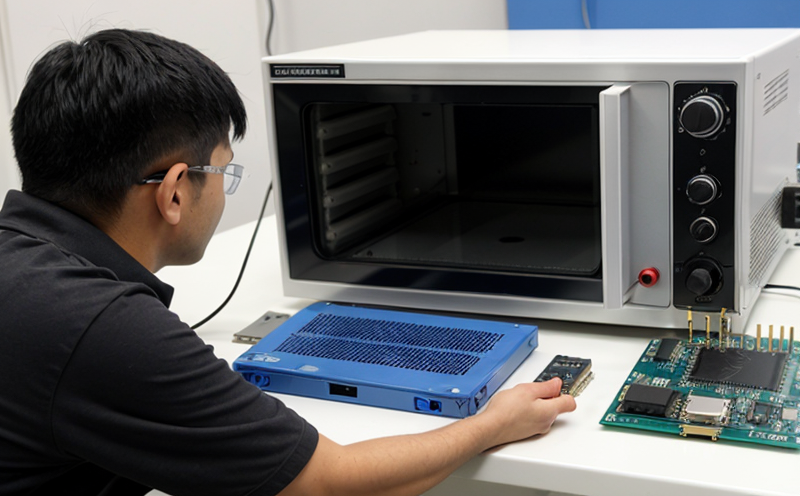IEEE 1149 Boundary Scan Testing for Microelectronic Components
The IEEE 1149.1 standard defines a boundary scan testing (BST) protocol that allows engineers and quality managers to test the integrity of microelectronic components without physically probing the pins or solder points. This non-intrusive method ensures the reliability, functionality, and interoperability of complex electronic circuits by providing a standardized way to interface with integrated circuits (ICs).
Boundary scan testing is particularly valuable in modern electronics manufacturing where miniaturization has led to increased complexity and reduced accessibility for traditional testing methods. By using IEEE 1149 BST, engineers can diagnose faults within the circuit board, verify connection integrity between components, and even reconfigure certain aspects of the ICs on the fly.
The process involves embedding special test logic into the microelectronic components during manufacturing. This embedded logic allows for automated testing through a Boundary Scan (BS) port, which is accessed via standard test interfaces such as JTAG (Joint Test Action Group). Once connected, the tester can apply stimuli to the ICs and observe responses without needing direct access to each component's pins.
IEEE 1149 BST supports various types of tests including:
- Pin connectivity checks
- Data pattern insertion and extraction
- Resistor network testing
- Thermal cycle stress simulation
- Circuit configuration verification
The method is widely used in the semiconductor industry for quality assurance, reliability engineering, and failure analysis. It ensures that each component meets its specified electrical characteristics and operates correctly within the intended environment.
| Industry Applications | Description |
|---|---|
| Data Center Servers | Ensuring high availability of critical servers through continuous testing and diagnostics. |
| Automotive Electronics | Verifying the robustness of safety-critical components in vehicles. |
| Aerospace Electronics | Guaranteeing component reliability under extreme environmental conditions. |
| Consumer Electronics | Improving product quality and reducing warranty costs through early defect detection. |
The IEEE 1149 BST protocol is recognized globally for its efficiency in troubleshooting, diagnosis, and maintenance of electronic systems. Its non-destructive nature makes it ideal for production line testing where minimizing downtime is crucial.
For quality managers and R&D engineers, boundary scan testing offers a powerful tool to enhance product reliability and reduce costs associated with early failures. By integrating IEEE 1149 BST into their test protocols, they can achieve higher levels of confidence in the performance and longevity of electronic products.
Industry Applications
Beyond its role in quality assurance, IEEE 1149 boundary scan testing finds extensive use across various industries. Here are some key applications:
| Industry Sector | Description of Application |
|---|---|
| Data Centers | Testing and validating the integrity of server boards to ensure continuous operation. |
| Aerospace & Defense | Verifying component reliability in space and military applications. |
| Consumer Electronics | Ensuring product quality through early defect detection and troubleshooting. |
| Automotive Manufacturing | Guaranteeing the safety and performance of automotive electronics under various conditions. |
In each sector, boundary scan testing plays a critical role in maintaining high standards of reliability and performance. The protocol's flexibility allows it to be adapted to meet specific industry challenges while adhering to international standards like ISO 9001 for quality management systems.
Customer Impact and Satisfaction
The implementation of IEEE 1149 boundary scan testing has a profound impact on customer satisfaction across multiple dimensions:
- Enhanced Product Reliability: Early defect detection leads to fewer field failures, reducing warranty costs.
- Improved Quality Assurance: Continuous testing ensures that products meet the highest standards of quality and performance.
- Rapid Troubleshooting: Non-invasive nature allows for quick identification and resolution of issues without disrupting production lines.
- Cost Efficiency: Reduces downtime by minimizing the need for rework or replacement of faulty components.
A satisfied customer base translates to better reputation, increased market share, and long-term business success. The use of IEEE 1149 BST contributes significantly to achieving these goals by providing a robust framework for testing and quality assurance.
International Acceptance and Recognition
The IEEE 1149 boundary scan testing protocol enjoys widespread recognition and acceptance across the globe, thanks to its comprehensive approach and alignment with international standards:
- ISO/IEC 7709: Aligns with ISO standards for test data interchange, ensuring interoperability.
- ASTM E2315: Supports the use of boundary scan testing in medical devices.
- EN 62443: Applies to electrical/electronic systems used in power generation and distribution, emphasizing reliability and safety.
The protocol's global acceptance is further reinforced by its adoption in numerous standards bodies such as the International Electrotechnical Commission (IEC) and the European Committee for Standardization (CEN). This broad support underscores IEEE 1149 BST's role as an industry standard for ensuring the reliability and functionality of microelectronic components.





